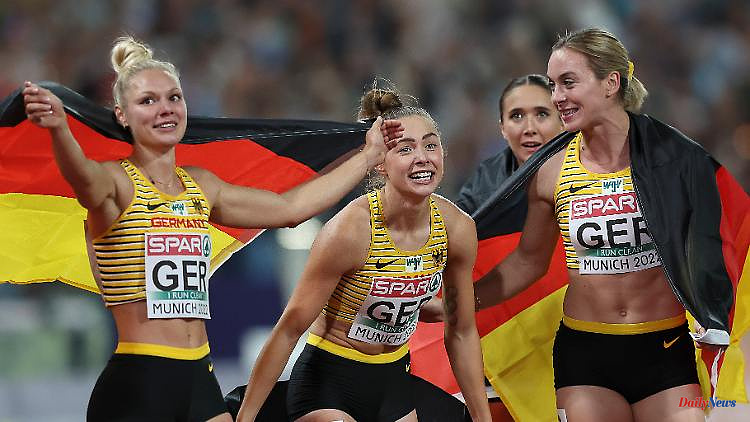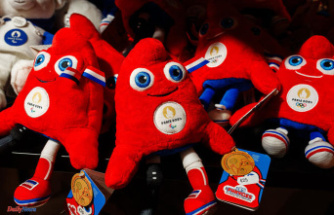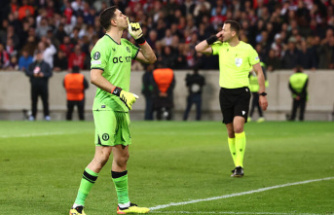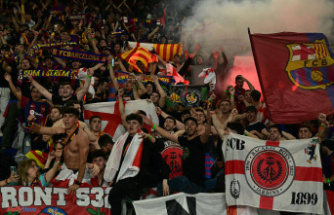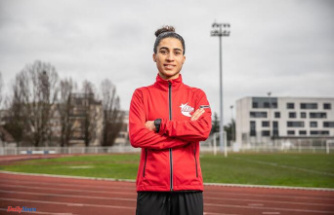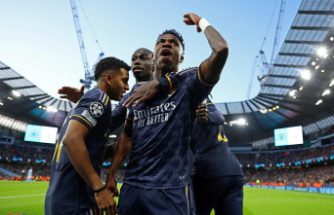Gina Lückenkemper is still in the hospital on Tuesday and has to have a gaping wound sewn up. Now she brings the European Athletics Championships the perfect conclusion from a German point of view. The women's 4x100-meter relay wins gold - and combines four very individual stories worth telling.
Gfreidi gives it his all again, but to be honest, the dancing squirrel could save himself the trouble. After the last decision of these European Championships, the plush, likeable mascot runs across the running track of the Olympic Stadium with a huge "Get Loud" flag, although the volume has long since reached its maximum. The German quartet flies over the women's 4x100 meters lap of the stadium, and when Rebekka Haase sprints across the finish line, it is almost impossible to understand one's own words in the collective jubilation. It is almost certainly the loudest moment of the seven atmospheric days at the European Athletics Championships in Munich.
The 42.34 seconds are the emotional culmination of a season whose four very different tales of woe make this triumph particularly emotional for Alexandra Burghardt, Lisa Mayer, Gina Lückenkemper and Rebekka Haase. They win in the end ahead of Poland (42.61 seconds) and Italy (42.84 seconds), the Britons are eliminated early after the fastest lead time due to a mistake made on the switch. This clears the way for the selection of the German Athletics Association, which also secured first place in the medal table at this European Championship with its seventh gold medal.
But back to the specific stories behind that run to the title. For Gina Lückenkemper, the clear favorite of the more than 40,000 people in the stadium based on the cheering volume at the athletes' presentation, it is already a success to even be on the track on this Sunday evening. "It's just incredibly awesome," she says at the stadium microphone, also because of the uncertainty of the previous days.
On Tuesday, the 25-year-old threw herself in the 100-meter final, became sensational European champion, but also lost her balance with serious consequences. She tears open her left knee with the spikes of her right foot and needs immediate first aid. While the laceration is being treated, Lückenkemper agrees with a wide grin and sits on a chair in the Laola wave - but then it goes to the emergency room.
The painfully deep cut on the knee has to be sewn up with eight stitches, and she only gets back to the team hotel after 1 a.m. Lückenkemper is sitting in the press conference on Wednesday and after the end of it he has to support himself with both hands when getting up in order to get back on his feet.
While she happily shares how exciting that first ambulance ride and visit to the ER was, she says Friday's season pre-season is definitely early. Jessica-Bianca Wessolly moves up, even without her superstar, the DLV quartet reaches the final. On Saturday evening the federation officially announces that the wound has healed sufficiently that the fastest woman in Europe is ready for the final.
In this final, Lückenkemper brings the German squadron up to third position and hands over to Rebekka Haase while in the lead. The two are close friends, and they often share a room at major championships. But after the Tokyo Olympics last year, Haase found himself in a deep hole.
Everyday tasks seem impossible to her, even walking to the fridge is difficult for her. "You are no longer able to do anything," said the 29-year-old Haase a few days ago in the sports show: "I couldn't mentally anymore." She skips the indoor season, gets psychological help and manages to return to the grueling life of a high-performance athlete. On her part, she says, she "only heard the stadium. I thank everyone who was here today".
A comeback story can also be told by Lisa Mayer, who, as the newly crowned European champion, sinks onto the track in front of the grandstand because tears of joy, relief, and salvation grip her. "Absolute emptiness," she says, she felt at that moment: "The emotions are so overwhelming." Only a few days before the European Championship did she manage to make the leap into the German squad.
The 26-year-old has been working backwards for years because her body needs breaks. Examples of this are last year's Olympic Games, for which she qualified with a personal best - before she had to leave before the start of the competition due to muscular problems. She can be recommended for Munich at the very last meeting before the final nomination and has run two strong races second up.
Alexandra Burghardt is responsible for the prelude and the final. After years of stagnation, at the beginning of 2020 she decided to rebuild in order to finally unleash the great potential that undoubtedly existed. In 2021 she finally made the breakthrough she had been waiting for for so long. At the German Championships, she wins the double over 100 and 200 meters, her first adult individual title. At the Olympics in Tokyo, she wins her preliminary and ends up eleventh in the addition of the three semifinals.
Burghardt then swapped the track for the ice track, and as a brakewoman for Mariama Jamanka, she made her debut in the two-man bobsleigh World Cup at the end of November 2021. A little later, they qualify for the Winter Games in Beijing. There Burghardt celebrates the biggest success of her career up to this season finale in Munich. She returns from China with Olympic silver and is subsequently awarded the Silver Laurel Leaf, the highest sporting award in the Federal Republic of Germany.
After that, she returns to athletics sprinting - where she is now crowned European Champion, not too far from where she was born in Upper Bavaria. "It's really almost like a fairy tale," she then summarizes on ZDF, how this moment should not only feel for her.
As emotional as this European championship title is for the four sprinters, at the moment of triumph they also think of those who have directly contributed to it. "It's unbelievable," Mayer describes her feelings in the same interview, "but I think I should also mention Tatjana (Pinto; editor's note) at this point, who might actually have been here, but unfortunately couldn't run due to injury (...), but also Jessica Wessolly from the prelims, who did a great job" and the substitute runner "Lisa Nippgen, who also supported our team".
Afterwards, Mayer, who is visibly fighting back tears, sums it up like this: "Well, that was really a team effort today." A team effort with very special signs, with very individual and extraordinary stories. Stories that culminate in a lap of honor, fueled by the applause of more than 40,000 people that just doesn't want to end.

